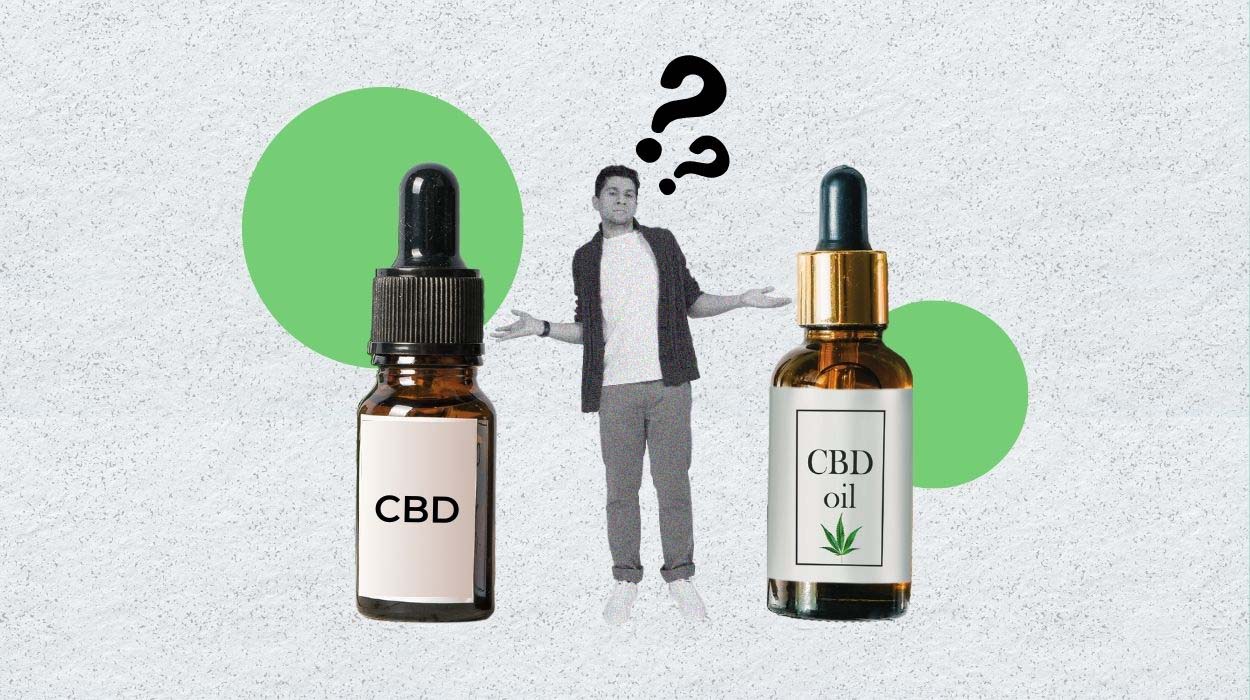 Expert's opinion
Expert's opinion
Expert's opinion
The article is a subjective view on this topic written by writers specializing in medical writing.
It may reflect on a personal journey surrounding struggles with an illness or medical condition, involve product comparisons, diet considerations, or other health-related opinions.
Although the view is entirely that of the writer, it is based on academic experiences and scientific research they have conducted; it is fact-checked by a team of degreed medical experts, and validated by sources attached to the article.
The numbers in parenthesis (1,2,3) will take you to clickable links to related scientific papers.
What To Look For When Buying CBD Oil 2024: 8 Signs Of A High-Quality Product

The popularity and usage of CBD are growing day by day, as many people like the way it makes them feel. Many people are using CBD oil to support their health. Due to its medicinal properties, the demand for cannabidiol for health and wellness is high. To meet this demand, new CBD companies are emerging time and again. But the key is to find high-quality CBD oil. In this read, you will learn the signs of a high-quality CBD oil.
How To Identify High-Quality CBD Oil?
- Extraction process of CBD oil
- Product made of naturally grown hemp
- Labeling of CBD products
- Third-party testing
- Certificate of analysis
- Cannabinoid profile
- Effective absorption of CBD oil
- Less than 0.3% THC
8 Signs Of A High-Quality Product What To Look For When Buying CBD Oil
When it comes to buying a product in the CBD market, product reviews are not just enough to determine the quality. Many factors make a high-quality CBD oil, so having the knowledge of the terminology, extraction process, labeling, and many other factors can go a long way. So these 8 signs can help you find high-quality CBD oil near you.
Extraction Process Of CBD Oil
The highest quality CBD oils use supercritical CO2[1] to extract. Safe solvents like ethanol and CO2 reduce residual solvent toxicity. Avoid CBD oils that use butane, propane, hexane, or pentane, as they leave behind toxic contaminants. Look for CBD oils that use ethanol or CO2 for extraction.
A solventless extract like rosin tinctures made with organic carrier oils is nontoxic, unlike butane and hexane. The use of carbon dioxide gives a cleaner and healthier product, as CO2 extraction does not contain any solvents or chemical residues.
Moreover, due to the properties of CO2 gas, supercritical CO2 extraction effuses through the entire plant matter, whereas the liquid properties of CO2 allow it to efficiently extract the compounds. Some labs use liquid CO2, whereas, some use CO2 gas. CO2 acts as a solvent and separates plant material and essential compounds, giving you a high-quality full-spectrum CBD oil.
Hemp Derived CBD Products
The hemp plant is well known for absorbing everything that is in the soil and that shows up in the foliage. Hence it is also called a hyperaccumulator plant. It can absorb both essential vitamins and minerals as well as toxic metals. This includes toxic metals like lead, mercury, arsenic, iron, cadmium, zinc, and copper.
The USDA does not certify hemp as organic. However, some reputed farms give information about where the hemp was grown. And some also claim their plants are pesticide-free. CBD oil is a mixture of cannabis oil and carrier oil. So, look for products that use USDA-certified organic carrier oil, instead of unknown purity industrial hemp.
The safest CBD oil is always sourced from the area where the government certifies the produce. Moreover, their fields are often tested for toxic substances. The oil must be tested by a lab accredited with ISO/IEC 17025:2017 as they make sure to certify products that are free from heavy metals, pesticides, solvent residue, bacteria, and fungus.
Labeling Of CBD Products
A reputable company with the best CBD products will have proper labeling of CBD content that is precisely measurable. Look for concentration or the milligrams count on the bottle. Higher the number, the more potent. An effective CBD oil contains 250mg- 1000mg per 10 ml of the bottle. Anything less than that is a waste of money.
The amount of CBD is mentioned in milligrams for the entire product and not for serving or a dose. Look for milligrams by milliliter(mg/ml), because this determines the concentration of CBD in a product.
A CBD oil bottle of 2000mg CBD oil comes to 40mg/ml only. Moreover, A pack of 300 mg CBD gummies may contain only 10mg per gummy with 30 gummies. Best products offer nearly 5mg of CBD per capsule of gummy.
However, most times it is written as 50mg of hemp extract per ml and will not mention the CBD content in that 50mg or 1 ml of hemp extract. The product you are buying should clearly label the contents and you as a customer should not be guessing.
Third-Party Testing
Make sure the product is verified by third-party testing, where the lab is an independent testing facility and it doesn’t hold any stake in this CBD product. A reputable company keeps these results public on the packaging or an insert or puts it on their website.
Many companies with good quality products and customer reviews are so proud of themselves that they will not keep calm, they will make sure you find the reports easily. Moreover, third-party lab tests are important as they state the concentrations of CBD and THC and even if they contain trace amounts of heavy metals.
If you happen to buy CBD gummies at a gas station or a CBD e-liquid at a vape store, make sure to scan the QR code on the package. Scan with your phone to see the lab reports. The State of Indiana has passed a law demanding all CBD products to be traceable with a scannable QR code on the package.
Certificate Of Analysis
A high-quality CBD product from a reputable brand comes with a detailed certificate of analysis with lab results from independent labs. As mentioned earlier, scan the QR code to see the lab reports. If it is not available, email the company and demand a COA.
Firstly, cross-check the CBD, THC levels on COA and product labels to make sure they match. These inaccuracies are a major issue while buying CBD products.
COA is a way to unveil the exact composition of the CBD product. Consider the COA invalid if the test was done long ago or if the lot number does not match or if you see a change in packaging. Always check the lot number and date.
Cannabinoid Profile
If you have a CBD product that is a full spectrum or broad-spectrum CBD, look for the cannabinoids[2] present in the CBD product. Along with the CBD and COA, the product should also contain a list of cannabinoids like cannabidiol acid( CBDA), cannabigerol(CBG), cannabinol(CBN), and cannabichromene(CBC). The list of cannabinoids should contain most of these.
Some products may deceive you by mentioning hemp seed oil, or Cannabis sativa oil, or hemp seeds and do not mention anything about cannabidiol or hemp extract. These contents are not the same as CBD. Due to ever-changing laws, some CBD products will be mentioned as hemp extract.
Effective Absorption Of CBD Oil
Did you know only 6% of CBD in standard tinctures is bioavailable? To increase the bioavailability, a new class of liposomal CBD products[3] that have greater absorption is used. The technologies like liposomal, water-soluble, nanoemulsions, microemulsions, and micellized CBD are known for high absorption. Look for these terms or Nano CBD. liposomal nano-emulsified CBD products have an immediate onset and an absorption rate of 6 times higher.
Traditional CBD tinctures may be slow working, but they are more affordable. Carrier oils not only preserve the CBD but also help our body absorb it. For the same reason, the main ingredients used are grape seed oil, olive oil, MCT oil, or cold-pressed hemp seed oil. Make sure your oil has them.
Less Than 0.3% THC
CBD oil cannot contain THC above 0.3%[4]. A percentage higher than this is considered marijuana and may be illegal. CBD oils made of hemp may have trace amounts of THC, usually 0.2 % or less.
But it will not make you high, however, low-standard processing may boost the THC levels to an extent that creates psychotropic effects. It is not only a low-quality product but can also be illegal according to the state you live in.
Benefits Of A High-Quality CBD Product?
A high-quality CBD oil can have potential benefits on health issues. It has effects such as anti-seizure, pain reliever, neuroprotective, anxiety reliever, anti-acne and anti-inflammatory, and in cancer treatment. Apart from these potential health benefits, a high-quality CBD oil may last longer. As it has a long shelf life.
Conclusion
The more of these signs a product claims, the more one can rely on them. There may not be a single brand or product that matches all these signs. And then, there may also be some amazing products that do not match many of these signs. Always buy full-spectrum oils made from whole-plant extracts, as they are considered signs of high-quality CBD oil.
Although CBD isolate is considered a pure form of CBD, it is made of cheap materials that lack flavonoids, terpenes, and cannabinoids. So, always consider these tips and further look for customer reviews before investing in a good quality product.
+ 4 sources
Health Canal avoids using tertiary references. We have strict sourcing guidelines and rely on peer-reviewed studies, academic researches from medical associations and institutions. To ensure the accuracy of articles in Health Canal, you can read more about the editorial process here
- Qamar, S., Torres, Y.J.M., Parekh, H.S. and Robert Falconer, J. (2021). Extraction of medicinal cannabinoids through supercritical carbon dioxide technologies: A review. Journal of Chromatography B, [online] 1167, p.122581. Available at: https://pubmed.ncbi.nlm.nih.gov/33639334/
- Meissner, H. and Cascella, M. (2021). Cannabidiol (CBD). [online] PubMed. Available at: https://www.ncbi.nlm.nih.gov/books/NBK556048/#:~:text=Other%20identified%20compounds%20are%20cannabidiol
- Bruni, N., Della Pepa, C., Oliaro-Bosso, S., Pessione, E., Gastaldi, D. and Dosio, F. (2018). Cannabinoid Delivery Systems for Pain and Inflammation Treatment. Molecules, [online] 23(10), p.2478. Available at: https://www.ncbi.nlm.nih.gov/pmc/articles/PMC6222489/
- Farinon, B., Molinari, R., Costantini, L. and Merendino, N. (2020). The Seed of Industrial Hemp (Cannabis sativa L.): Nutritional Quality and Potential Functionality for Human Health and Nutrition. Nutrients, [online] 12(7), p.1935. Available at: https://pubmed.ncbi.nlm.nih.gov/32610691/



